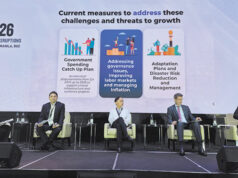A champion of financial inclusion
When he first took office as Bangko Sentral ng Pilipinas’ (BSP) Governor in May 2017, Nestor A. Espenilla, Jr. vowed to push for general policy continuity under a plan of action dubbed, “Continuity++.” At the time, the Philippine economy was at the peak of its years-long bull run, with strong government and consumer consumption, as well as a good investor outlook putting the country among the best-performing economies in the world.
“It’s all about continuing what we have been doing in the constant surveillance of the monetary and financial system to make sure it is resilient and stable,” Mr. Espenilla said following his appointment as BSP chief.
He made good on his promises. Under his leadership, the BSP continued to support the Philippines’ economic growth through constant vigilance over the monetary and financial system. At the same time, Mr. Espenilla spearheaded major reforms covering Philippine monetary and financial policies, including the digitalization of the country’s retail payment system for a more inclusive and efficient financial system.
After the news of his passing broke, many of his contemporaries in government and the financial industry hailed Mr. Espenilla as one of the country’s foremost champions of the pursuit of financial inclusion. Not only did his initiatives toward bringing the Philippine banking system to the digital age made it more accessible for ordinary Filipino, but they also fueled economic growth through the promotion and development of emerging financial technologies.
“Fintech innovations can also help drive financial inclusion as access and usage of financial services continue to be limited,” Mr. Espenilla once said. “An important part of this solution is digital enablement.”
Digital initiatives, according to the BSP, could help the growth of Filipinos’ Personal Equity and Retirement Account (PERA), the voluntary retirement accounts comprising personal savings and investments launched to promote capital market development as well as the value of savings among Filipinos. Such initiatives would also benefit women and speed up economic growth by improving the efficiency and productivity of consumers.
“[Digitalization] provides the convenience of being able to do banking and financial services from home. Even if you’re taking care of your family, you’ll be able to do banking,” he said.
“The fact that liquidity cycles to the economy more quickly creates efficiency and productivity and that’s going to help economic growth. So, in fact, studies show that economic growth rises as the economy becomes more digitalized,” he added.
In his duty, Mr. Espenilla led policies to increase incomes by strengthening the banking sector and developing the domestic capital market, working with major players like the Asian Development Bank to make financial services and literacy available to all Filipinos, and to modernize the payment system as a means to safely and securely distribute the benefits.
Of these initiatives, many are ongoing efforts to develop the domestic bond market, to bring modern, efficient, accessible banking to rural underserved areas.
“Mr. Espenilla’s leadership in BSP’s pursuit of financial sector development and inclusion will remain an inspiration to all of us working to expand access to financial services for the poor and smaller enterprises, a key challenge in Asia,” ADB President Takehiko Nakao said.
“We look forward to continuing our support to his vision — a Philippines with strong, sustained growth and where no one is left behind,” he added. — Bjorn Biel M. Beltran



